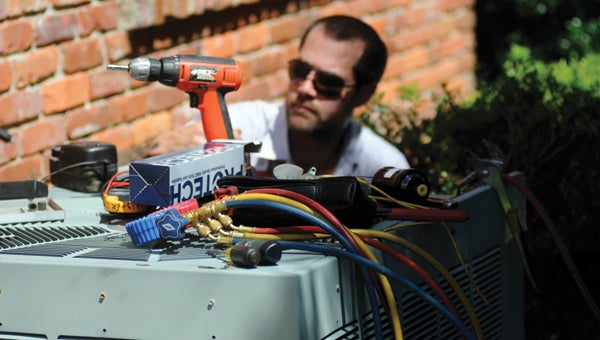AC units struggling under summer heat
Published 3:59 pm Tuesday, July 10, 2012

Lee Electric’s Randall Evans works on an air conditioning unit on Tuesday. With temperatures hovering around the 100-degree mark, air conditioning units are having to work overtime to keep homes cool. (Advocate Staff/Patty Vaughan)
The heat wave has officially hit Alabama and air conditioners are working overtime across the state to beat the 95 and 100-degree weather.
However, if air conditioners are not properly maintained or taken care of, that 100-degree weather can quickly seep inside.
“A lot of times you may go through milder weather and (the air conditioner) may seem fine but when the weather gets extreme, if there’s anything wrong with it, it shows up then,” Lee Electric Inc. owner Mack Lee said.
One of the biggest problems Lee sees is people not consistently changing the air filter in the unit.
If the air filter is not changed on a regular basis, the airflow decreases ultimately decreasing the efficiency of the unit. It can also clog the cooling coil in the unit.
“We always tell all our customers when they get their power bill every month to change their filter at that time,” Lee said. “A lot of times the filters will just be completely packed, and if they’re in that bad of shape, usually the cooling coil that is in the piece of equipment will get stopped up too.”
One purchase to avoid is the pleated skirt filters that are deemed as allergy filters, Lee said.
“When we go to our service schools, (instructors) will hold those (filters) up and say, ‘This is the worst thing that has ever happened to air conditioning,’” Lee said. “They’re good for pulling small pollen particles out of the air but they restrict your air flow.”
As for keeping the unit clean and to keep condensation from getting on the floor, Lee said to add a little bit of Clorox to the draining pan once a month. This will help keep the condensation drain from becoming clogged.
“Something else is when you’re mowing you’re yard, make sure that the outside part of the air conditioner is not running,” Lee said. “Don’t throw the clipping at the air conditioner, because if it’s running, it just sucks those clippings to the outdoor coil and that restricts the air that the air conditioner is trying to pull through.”
The telltale sign if the air conditioner is not working or not running efficiently is if the unit continues to run for a long period of time.
“When you have the 95-100 degree weather like we’ve had, they’re pretty much all going to run continuously,” Lee said.
“If you notice when it’s only saying about 85-90 degrees, and it’s running all the time, that tells you something is not quite right with it.”
To keep air conditioners up to date and working efficiently, treat the unit almost like a vehicle that needs to be serviced once or twice a year.
Lee recommends having someone check the unit once before heating season and once before cooling season.
“I usually try and tell them if the unit is more than 10 years old that they’re probably going to save about 25-35 percent on their power bill if they’ll upgrade to a new unit,” Lee said. “Because of the economy, people are repairing a lot more stuff than rather taking the plunge into a new system.”
Tips for staying cool while spending less
* Use ceiling and oscillating fans to create a “wind chill” effect. The moving air makes the temperature feel cooler and allows a higher air conditioner thermostat setting while maintaining cooling comfort. For each 1-degree increase in the thermostat setting, cooling costs can be lowered by about 3 percent.
* Avoid unnecessary trips in and out of the house, which let in hot, humid air.
* Turn off lights, televisions, and computers when not in use.
* Close drapes and shades on sunny days.
* Plan to do hot work, washing and drying clothes, cooking, and baking, during cooler morning and evening hours.
* Keep your kitchen cooler by cooking in a microwave oven or grilling outdoors.
* Make sure heat-producing appliances like televisions and lamps are away from the thermostat.
* Install a timer or a programmable thermostat to increase and decrease the temperature automatically. Leave it on a higher temperature while you are away, and set it to cool the house half an hour before you return home.
* Seal air leaks and cracks. Weather stripping and caulking are inexpensive ways to improve efficiency and cut energy costs year round.
* Ventilate the attic, and check insulation. Adequately sized vents and/or an attic fan can help keep hot air from building up. If you can see the ceiling joists in your attic, consider adding insulation. Proper attic insulation can save up to 30 percent of your cooling bill. Be sure the insulation does not block vents or cover exhaust fans.
— Courtesy of Pioneer Electric Cooperative





